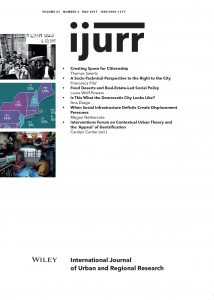The concept of gentrification has become stretched, both conceptually and geographically, in ways that both erode its utility and displace alternative ways of understanding the displacement of lower-income people by urban transformation. Among the negative consequences that we consider is that the resulting pressure to reframe analysis in terms of gentrification reinforces Anglo-American academic hegemony and increases the difficulty of introducing more appropriate theoretical approaches from scholars in, and of, the global South. We draw on the anthropological concepts of emic and etic analysis to illustrate the dangers of such erasure and displacement of alternative frames of understanding. At the same time, the theoretical extension of the concept of gentrification to replace alternative ways of thinking about the displacement of lower income populations, such as ‘urban renewal’, has reduced the analytical utility of gentrification itself by confusing different mechanisms by which this is achieved. We illustrate the problems through consideration of the sustained tradition of work on displacement in Hong Kong using other conceptual frames. We encourage greater openness to alternative critical traditions that offer insights into the dislocation of poorer urban populations.
Details
Written by:
Alan Smart & Josephine Smart
Digital Object Identifier (DOI)
10.1111/1468-2427.12493
About DOI

